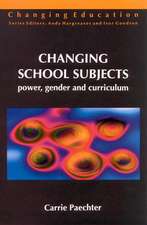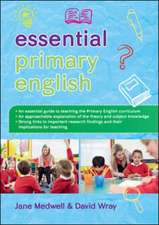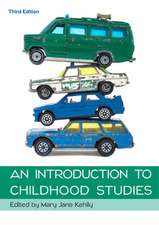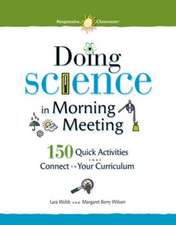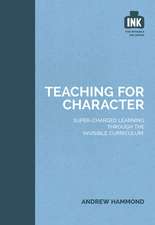Reconceptualizing Early Mathematics Learning: Advances in Mathematics Education
Editat de Lyn D. English, Joanne T. Mulliganen Limba Engleză Paperback – 20 iun 2015
| Toate formatele și edițiile | Preț | Express |
|---|---|---|
| Paperback (1) | 642.51 lei 6-8 săpt. | |
| SPRINGER NETHERLANDS – 20 iun 2015 | 642.51 lei 6-8 săpt. | |
| Hardback (1) | 648.89 lei 6-8 săpt. | |
| SPRINGER NETHERLANDS – 23 mai 2013 | 648.89 lei 6-8 săpt. |
Din seria Advances in Mathematics Education
- 15%
 Preț: 648.24 lei
Preț: 648.24 lei - 18%
 Preț: 905.06 lei
Preț: 905.06 lei - 15%
 Preț: 660.04 lei
Preț: 660.04 lei - 18%
 Preț: 959.98 lei
Preț: 959.98 lei - 15%
 Preț: 661.97 lei
Preț: 661.97 lei - 15%
 Preț: 657.57 lei
Preț: 657.57 lei - 24%
 Preț: 1337.47 lei
Preț: 1337.47 lei - 20%
 Preț: 581.65 lei
Preț: 581.65 lei - 15%
 Preț: 665.58 lei
Preț: 665.58 lei - 15%
 Preț: 653.14 lei
Preț: 653.14 lei - 24%
 Preț: 647.54 lei
Preț: 647.54 lei - 18%
 Preț: 1127.28 lei
Preț: 1127.28 lei - 18%
 Preț: 1129.02 lei
Preț: 1129.02 lei - 15%
 Preț: 656.89 lei
Preț: 656.89 lei - 18%
 Preț: 786.04 lei
Preț: 786.04 lei - 18%
 Preț: 1024.53 lei
Preț: 1024.53 lei - 15%
 Preț: 656.43 lei
Preț: 656.43 lei - 18%
 Preț: 1134.06 lei
Preț: 1134.06 lei - 24%
 Preț: 842.57 lei
Preț: 842.57 lei - 18%
 Preț: 898.26 lei
Preț: 898.26 lei - 18%
 Preț: 957.62 lei
Preț: 957.62 lei - 24%
 Preț: 991.37 lei
Preț: 991.37 lei - 24%
 Preț: 785.09 lei
Preț: 785.09 lei - 18%
 Preț: 1009.54 lei
Preț: 1009.54 lei - 18%
 Preț: 1013.96 lei
Preț: 1013.96 lei - 24%
 Preț: 790.73 lei
Preț: 790.73 lei - 24%
 Preț: 797.39 lei
Preț: 797.39 lei
Preț: 642.51 lei
Preț vechi: 755.88 lei
-15% Nou
Puncte Express: 964
Preț estimativ în valută:
122.96€ • 127.90$ • 101.51£
122.96€ • 127.90$ • 101.51£
Carte tipărită la comandă
Livrare economică 14-28 aprilie
Preluare comenzi: 021 569.72.76
Specificații
ISBN-13: 9789401783521
ISBN-10: 9401783527
Pagini: 340
Ilustrații: VIII, 329 p.
Dimensiuni: 155 x 235 x 18 mm
Greutate: 0.48 kg
Ediția:2013
Editura: SPRINGER NETHERLANDS
Colecția Springer
Seria Advances in Mathematics Education
Locul publicării:Dordrecht, Netherlands
ISBN-10: 9401783527
Pagini: 340
Ilustrații: VIII, 329 p.
Dimensiuni: 155 x 235 x 18 mm
Greutate: 0.48 kg
Ediția:2013
Editura: SPRINGER NETHERLANDS
Colecția Springer
Seria Advances in Mathematics Education
Locul publicării:Dordrecht, Netherlands
Public țintă
ResearchCuprins
Introduction: Lyn English and Joanne Mulligan: Perspectives on Reconceptualising Early Mathematics Learning.- Chapter 1: Kristie J. Newton and Patricia A. Alexander: Early Mathematics Learning in Perspective: Eras and Forces of Change.- Chapter 2: Joanne Mulligan and Michael Mitchelmore: Early Awareness of Mathematical Pattern and Structure.- Chapter 3: Joanne Mulligan, Lyn English, Michael Mitchelmore, and Nathan Crevensten: Reconceptualising Early Mathematics Learning: The Fundamental Role of Pattern and Structure.- Chapter 4: Lyn English: Reconceptualising Statistical Learning in the Early Years.- Chapter 5: Herb Ginsburg: Cognitive guidelines for the design and evaluation of early mathematics software:The example of MathemAntics.- Chapter 6: Doug Clements and Julie Sarama: Rethinking Early mathematics: What Is Research-Based Curriculum for Young Children?.- Chapter 7: Bob Perry and Sue Dockett: Reflecting on Young Children’s Mathematics Learning.- Chapter 8: Anita Wager: Practices that Support Mathematics Learning in A Play-based Classroom.- Chapter 9: Bert van Oers: Communicating about Number: Fostering Young Children’s Mathematical Orientation in the World.- Chapter 10: Kristy Goodwin and Kate Highfield: A Framework for examining technologies and early mathematics learning.- Chapter 11: Marja van den Heuvel-Panhuizen and Iliada Elia: The role of picture books in young children’s mathematical learning.- Chapter 12: Marina Papic:Improving numeracy outcomes for young Australian Indigenous children.- Chapter 13: Elizabeth Warren and Jodie Miller: Enhancing teacher professional development for early years mathematics teachers working in disadvantaged contexts.- Chapter 14: Heidi A. Diefes-Dux, Lindsay Whittenberg, and Roxanne McKee Mathematical modeling at the intersection of elementary mathematics, art, and engineering education.
Textul de pe ultima copertă
This book emanated primarily from concerns that the mathematical capabilities of young children continue to receive inadequate attention in both the research and instructional arenas. Research over many years has revealed that young children have sophisticated mathematical minds and a natural eagerness to engage in a range of mathematical activities. As the chapters in this book attest, current research is showing that young children are developing complex mathematical knowledge and abstract reasoning a good deal earlier than previously thought. A range of studies in prior to school and early school settings indicate that young learners do possess cognitive capacities which, with appropriately designed and implemented learning experiences, can enable forms of reasoning not typically seen in the early years. Although there is a large and coherent body of research on individual content domains such as counting and arithmetic, there have been remarkably few studies that have attempted to describe characteristics of structural development in young students’ mathematics. Collectively, the chapters highlight the importance of providing more exciting, relevant, and challenging 21st century mathematics learning for our young students. The chapters provide a broad scope in their topics and approaches to advancing young children’s mathematical learning. They incorporate studies that highlight the importance of pattern and structure across the curriculum, studies that target particular content such as statistics, early algebra, and beginning number, and studies that consider how technology and other tools can facilitate early mathematical development. Reconceptualizing the professional learning of teachers in promoting young children’s mathematics, including a consideration of the role of play, is also addressed.
Caracteristici
Addresses reconceptualising early mathematics learning and reports on extensive and recent research Provides a future-oriented perspective on advancing young children's mathematical development Represents an internationally significant, innovative, and powerful approach to promoting young children's mathematical development? Includes supplementary material: sn.pub/extras


